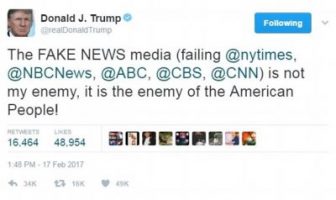Social Media in Politics
How America is Becoming A Reality TV Show
In recent years, rapid advancements in technology have given way to a world which is controlled through a screen. With this, the popularity of apps such as Twitter and Instagram have gained an exponential number of users, becoming platforms for billions to share their ideas and connect with others across the globe.
The popularity of social media has even led politicians, namely Donald Trump, to take to Twitter and Facebook in order to post videos and links about their campaign and easily connect with potential voters. Being a useful and necessary tool for politicians due to its timeliness and ability to reach a large cross-section of voters, it is clear that social media wields great power and influence.
This power is exhibited through the popularity of Trump’s tweets, which are chalk-full of strong vocabulary and controversial opinions. From insulting other politicians to thrashing the media for “fake news,” Trump has certainly come under fire for these tweets–but, his social media followers continue to grow.
In order to analyze this fascinating trend, we asked Colleen Sousa, who teaches AP Modern European History, AP Comparative, and Global Studies 21, for her opinion on social media’s new role in politics. Sousa describes social media as an “inescapable” part of modern life that “must be managed.” In fact, she is quite active on social media, where she said she “shares news articles that are important, and [her] own political commentary on national and global news.”
Xenia Efimov, a senior at Fairfield Ludlowe, shared Sousa’s view on social media, calling it a “revolutionary” tool used to “share ideas” and “make one’s voice heard.” But, unlike Sousa, her online presence is limited, where she “has never used social media to promote [her] beliefs in politics,” as she “feels no need to promote any one belief.”
Regardless of how they use social media, they both agreed on one thing: they do not get their news off of social media. In Sousa’s words, social media “takes gray and complex situations and sensationalizes them so that it is just black and white,” meaning most of the information is left out and replaced with the “most sensational things” in an effort to grab readers’ attentions.
Similarly, Efimov said that social media platforms “are fueled greatly by an unfiltered mass of opinion that are not always fact-based.” With how unregulated social media is, it’s not surprising that its reliability is shaky.
Nonetheless, millions of Americans continue to rely on social media as their primary news source. According to a Pew Research Center Survey, about 67% of American adults rely on social media sites like Facebook and Twitter to get their news.
With social media’s unreliability, it is odd to find such a large amount of people looking to Instagram and Twitter for news.
This led to the question of whether people were losing sight of politics in place of entertainment. Efimov delivered a clear answer, explaining how “politics has grown to be more of an entertainment industry rather than the bearer of true, authentic facts.”
Ultimately, Trump’s comments may be inappropriate for someone in his position, but he continues to gain more followers because people simply look at his social media posts as entertainment. As Sousa said, “Trump is a reality TV president for an audience that loves TV.”
Face it: people love the controversy Trump’s comments bring, as it provides for a good debate and hearty laugh. But, it has gotten to the point where he has become defined by his tweets instead of by his actual policies.
Social media sites only supplement this transition away from politics. They are not stupid: they know what sells, and paragraphs about politics certainly aren’t appealing to most.
By creating small, attractive headlines devoid of all the facts, sites are able to garner views and increase their revenue. Of course, though, this is all at the expense of the education of the reader, where people are now unaware of current politics.
As seniors become of voting age, with underclassmen just a couple years away, it is necessary to find the facts and not sell out for an interesting headline that contains little factual information.
Remember, as was repeated throughout the recent midterm elections, your vote matters. We are the future; do not let entertainment affect the ballots, or else we may remain an audience for a reality TV president for years to come.

Chris is an Op-Ed/Features writer in his first year with The Prospect staff.

